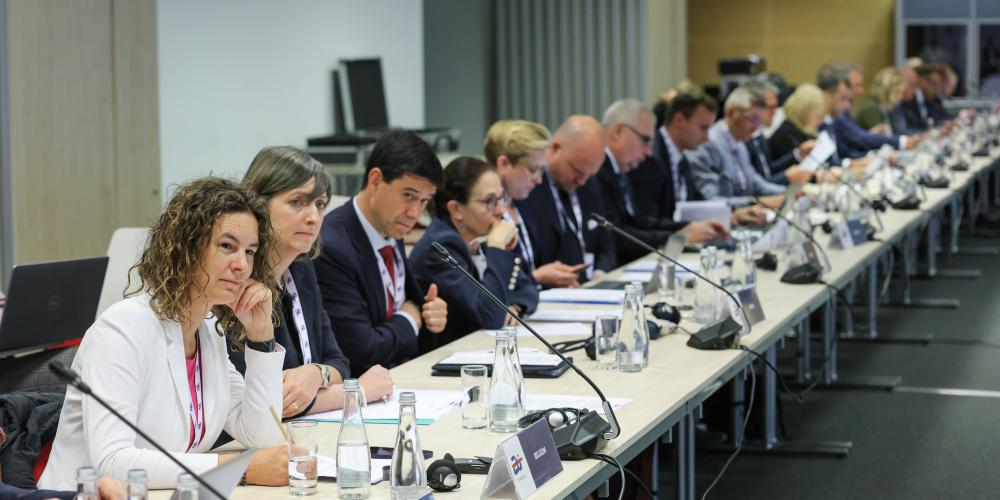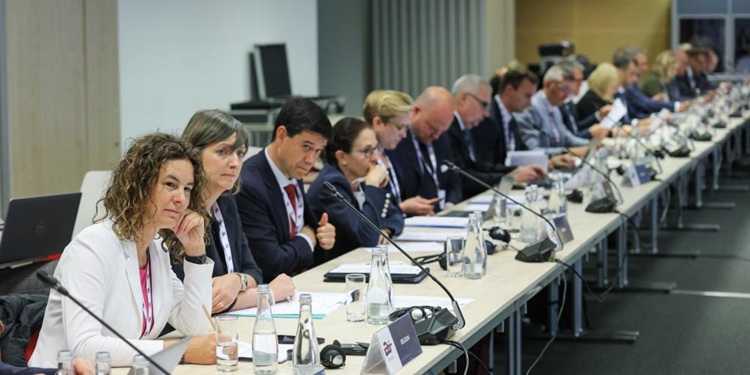22/05/2025
6 min readNP: Centro Crisis Europeo-Bruselas
El miércoles 21 de mayo de 2025, la Red de Directores Generales de Centros Europeos de Crisis se reunió por duodécima vez. La reunión tuvo lugar en Varsovia (Polonia), en el marco de la Presidencia polaca del Consejo de la Unión Europea. El Centro Nacional de Crisis de Bélgica coorganizó la reunión con el Centro de Seguridad del Gobierno polaco.
Esta es la quinta vez que la red se reúne en el país que ostenta la Presidencia del Consejo de la Unión Europea. Esto subraya la importancia de fortalecer los vínculos entre la UE y las estructuras nacionales de crisis para apoyar nuestros esfuerzos conjuntos en la gestión de crisis.
El tema central de la reunión fue la resiliencia social, con especial atención a las lecciones aprendidas de la guerra de agresión de Rusia contra Ucrania.
A la reunión asistieron 24 Estados miembros de la UE, así como Noruega, Islandia e instituciones y organizaciones europeas. Ucrania y Moldavia también asistieron a la reunión por primera vez. Juntos, los participantes debatieron temas como la resiliencia de las entidades críticas, el reciente apagón en España y Portugal, y la Estrategia de Preparación de la Unión publicada recientemente por la Comisión Europea. La presencia de un gran número de Estados miembros demuestra una vez más la voluntad de cooperar más estrechamente para fortalecer la gestión de crisis a nivel europeo.
“Al compartir nuestros conocimientos y perspectivas, podemos seguir fortaleciendo nuestros esfuerzos colectivos en la gestión de crisis” - Leen Depuydt, Director General en funciones del Centro Nacional de Crisis de Bélgica.
La jornada comenzó centrándose en las lecciones aprendidas —y aún por aprender— de la guerra de agresión de Rusia en Ucrania, en particular en lo que respecta a la resiliencia de la sociedad civil ucraniana. La Ministra polaca para la Sociedad Civil, Sra. Porowska, y el Embajador de la República de Polonia en Ucrania, Sr. Łukasiewicz, animaron a los miembros de la red a organizar e involucrar a sus respectivas sociedades civiles en caso de desastre, inspirándose en la labor de las ONG. De hecho, la movilización de las organizaciones cívicas ha tenido un enorme impacto en la resiliencia de la sociedad ucraniana en su conjunto.
También estuvieron presentes organizaciones internacionales. La OTAN compartió su visión de la resiliencia social con la Red. La Comisión Europea presentó su iniciativa para realizar pruebas de resistencia en los centros de crisis, con el objetivo de identificar debilidades, obtener resultados y lecciones aprendidas, y en última instancia, fortalecer la resiliencia general de la UE.
Por la tarde, la atención se centró en el futuro. Tras presentar el trabajo realizado durante su presidencia, la presidencia polaca inició un intercambio de ideas sobre la Estrategia de Preparación de la Unión, publicada recientemente por la Comisión Europea. Se invitó a los directores generales a compartir sus perspectivas sobre la Estrategia, en particular en lo que respecta a la respuesta a las crisis.
La reunión fue una excelente oportunidad para descubrir buenas prácticas, destacar los éxitos y reflexionar juntos sobre el valor añadido de la cooperación con la sociedad civil en la gestión de crisis.
La Red de Directores Generales de Centros Europeos de Crisis se creó en 2018 por iniciativa del Centro Nacional de Crisis de Bélgica y cuenta con el apoyo de la Secretaría General del Benelux. Su objetivo es desarrollar la coordinación entre las autoridades nacionales de gestión de crisis, informarse mutuamente sobre los retos a los que se enfrentan los diferentes centros de crisis, compartir los conocimientos y experiencias existentes, a la vez que se apoyan mutuamente en la implementación de soluciones comunes a nivel nacional.

On Wednesday 21 May 2025, the Network of Directors General of European Crisis
Centres met for the 12th time. The meeting took place in Warsaw, Poland, as part of the Polish Presidency of the Council of the European Union. The Belgian National Crisis Centre co-organised the meeting with the Polish Government Centre for Security.
This is the fifth time that the network has met in the country holding the Presidency of the Council of the European Union. This underlines the importance of strengthening links between the EU and national crisis structures to support our joint efforts in crisis management.
The central theme of the meeting was societal resilience, with a particular focus on lessons learned from Russia’s war of aggression against Ukraine.
The meeting was attended by 24 EU Member States, as well as Norway, Iceland and European institutions and organisations. Ukraine and Moldova also attended the meeting for the first time. Together, the participants discussed issues such as the resilience of critical entities, the recent blackout in Spain and Portugal, and the Union Preparedness Strategy recently published by the European Commission. The presence of a large number of Member States once again demonstrates the willingness to cooperate more closely to strengthen crisis management at the European level.
“By sharing our knowledge and perspectives, we can continue to strengthen our collective efforts in crisis management”- Leen Depuydt, Director-General a.i. of the Belgian National Crisis Centre
The day began with a focus on the lessons learned—and still to be learned—from Russia’s war of aggression in Ukraine, particularly regarding the resilience of Ukrainian civil society. The Polish Minister for Civil Society, Ms. Porowska, and the Ambassador of the Republic of Poland to Ukraine, Mr. Łukasiewicz, encouraged the members of the network to organize and involve their respective civil societies in the event of a disaster, drawing inspiration from the work of NGOs. Indeed, the mobilization of civic organizations has had a tremendous impact on the resilience of Ukrainian society as a whole.
International organizations were also present. NATO shared its vision of societal resilience with the Network. The European Commission presented its initiative to conduct stress tests on crisis centres, aimed at identifying weaknesses, obtaining results and lessons, and ultimately strengthening the EU’s overall resilience.
In the afternoon, the focus shifted to the future. After presenting the work carried out during their presidency, the Polish presidency initiated an exchange of ideas on the Union Preparedness Strategy, recently published by the European Commission. Directors-general were invited to share their perspectives on the Strategy, particularly regarding crisis response.
The meeting was an excellent opportunity to discover best practices, highlight successes, and reflect together on the added value of cooperation with civil society in crisis management.
The Network of Directors-General of European Crisis Centres was created in 2018 on the initiative of the Belgian National Crisis Centre and is supported by the Benelux General Secretariat. It aims to develop coordination between national crisis management authorities, be mutually informed about the challenges faced by different crisis centres, share existing expertise and experiences while supporting each other in implementing common solutions at the national level.


